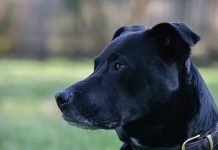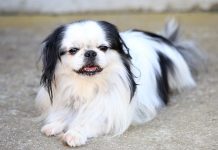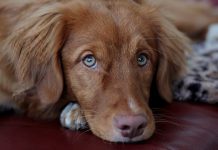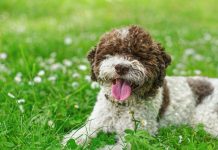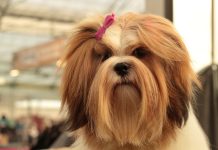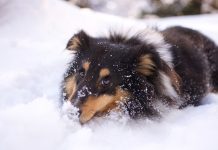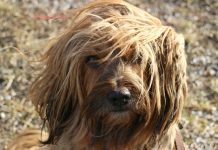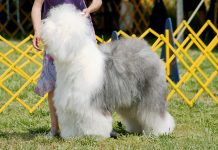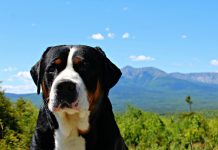History and Origins of the Bernese Mountain Dog Breed

The Bernese Mountain Dog, also known as the Berner Sennenhund, is a striking and versatile breed with a rich history rooted in the Swiss Alps. Here’s a brief overview of their fascinating history:
- Ancient Working Dogs: Bernese Mountain Dogs are one of four Sennenhund breeds originating from the Swiss Alps, where they were developed as versatile working dogs. Their ancestors likely accompanied Roman armies and were later used for herding cattle and guarding farmsteads.
- Specifically Swiss Breed: The Bernese Mountain Dog is named after the Canton of Bern in Switzerland, where they were originally bred. They are considered a part of Switzerland’s heritage and were valued for their strength, endurance, and reliability.
- Multi-Purpose Working Dogs: Historically, Bernese Mountain Dogs were employed as draft dogs to pull carts loaded with milk, cheese, and other goods to market. They also excelled as farm dogs, herding livestock, and serving as loyal companions to Swiss farmers and families.
- Breed Development: The breed’s development was largely influenced by Swiss farmers and breeders who sought to create a robust and versatile dog capable of thriving in the harsh Alpine environment. Selective breeding emphasized traits like strength, intelligence, and a gentle temperament.
- Recognition and Preservation: The Bernese Mountain Dog was officially recognized by the Swiss Kennel Club in 1907. Efforts to preserve and promote the breed’s unique characteristics eventually led to international recognition and popularity.
Physical Characteristics and Appearance of Bernese Mountain Dogs
Bernese Mountain Dogs are known for their striking appearance and sturdy build. Here are the key physical characteristics of the breed:
- Size: Bernese Mountain Dogs are large and powerful dogs. Adult males typically stand 25 to 27.5 inches (63 to 70 cm) at the shoulder, while females are slightly smaller, ranging from 23 to 26 inches (58 to 66 cm). They usually weigh between 80 to 115 pounds (36 to 52 kg).
- Build: The breed has a strong and well-balanced build, with a deep chest, broad shoulders, and muscular legs. They are heavy-boned and robust, reflecting their heritage as working dogs.
- Coat: Bernese Mountain Dogs have a distinctive tri-colored coat with a thick and moderately long outer coat and a dense undercoat. The coat colors consist of black with rich rust and white markings. The rust appears over the eyes, on the cheeks, sides of the chest, legs, and under the tail.
- Head: Bernese Mountain Dogs have a broad and slightly rounded head, with a straight muzzle and a gentle expression. Their eyes are dark brown and almond-shaped, conveying a friendly and intelligent demeanor.
- Ears: The breed’s ears are medium-sized, triangular, and set high on the head. They hang down close to the cheeks when in a natural position.
- Tail: Bernese Mountain Dogs have a bushy tail that reaches to the hocks. The tail is carried low when the dog is relaxed and may be raised slightly when alert or excited.
- Gait: Bernese Mountain Dogs have a smooth and efficient gait, covering ground with an effortless trot. They move with a purposeful and steady stride, reflecting their heritage as draft and farm dogs.
- Overall Impression: Bernese Mountain Dogs are known for their gentle and affectionate temperament, coupled with their imposing size and striking appearance. They are sturdy, well-muscled dogs with a calm and confident demeanor.
Bernese Mountain Dogs are beloved for their friendly and loving nature, making them excellent family companions and versatile working dogs. Their distinctive appearance and loyal personality have earned them a dedicated following around the world. Proper care, training, and socialization are essential for raising a happy and well-adjusted Bernese Mountain Dog.
Bernese Mountain Dog Temperament and Personality Traits
- Gentle and Affectionate: Bernese Mountain Dogs are known for their sweet and loving temperament. They are affectionate and thrive on companionship with their family members.
- Good-Natured and Calm: This breed typically exhibits a calm and easygoing demeanor. They are patient and tolerant, especially with children.
- Friendly with Strangers: Bernese Mountain Dogs are generally friendly and approachable with strangers, although they may initially be reserved.
- Loyal and Protective: Despite their friendly nature, Bernese Mountain Dogs are naturally protective of their family and home. They will alert their owners to unfamiliar visitors but are not aggressive without cause.
- Intelligent and Willing to Please: Bernese Mountain Dogs are intelligent and responsive to training. They are eager to please their owners, which makes them trainable and adaptable.
- Good with Children and Other Pets: Bernese Mountain Dogs are excellent family dogs and get along well with children and other pets when properly socialized from a young age.
- Moderate Energy Level: While Bernese Mountain Dogs are not hyperactive, they do require regular exercise to stay healthy and mentally stimulated. They enjoy daily walks and moderate play sessions.
- Sensitivity: Bernese Mountain Dogs are sensitive dogs that respond well to positive reinforcement training methods. Harsh corrections or punishment can be detrimental to their confidence and trust.
- Adaptable: Despite their large size, Bernese Mountain Dogs can adapt well to various living situations, including apartment living, as long as they receive adequate exercise and attention.
- Companionship Needs: Bernese Mountain Dogs thrive on companionship and may experience separation anxiety if left alone for long periods. They do best when they can spend time with their family.
Training and Socialization Needs for Bernese Mountain Dogs
- Early Socialization: Begin socializing your Bernese Mountain Dog puppy early by exposing them to various people, animals, and environments. Positive interactions will help them develop into confident adults.
- Basic Obedience Training: Start obedience training as soon as you bring your Bernese Mountain Dog home. Use positive reinforcement techniques such as treats, praise, and toys to motivate and reward good behavior.
- Consistent Leadership: Establish yourself as a calm and confident leader. Bernese Mountain Dogs respond well to gentle guidance and consistent rules.
- Gentle Handling: Due to their sensitive nature, handle your Bernese Mountain Dog gently during training and everyday interactions. Use a calm voice and avoid physical corrections.
- Exercise Requirements: Provide regular exercise to keep your Bernese Mountain Dog physically fit and mentally stimulated. Daily walks, playtime, and interactive activities are important for their well-being.
- Patience and Persistence: Bernese Mountain Dogs can be stubborn at times, so patience and persistence are key when training. Keep training sessions short, fun, and engaging.
- Socialization with Children and Pets: Expose your Bernese Mountain Dog to children, other dogs, and household pets early and often. Supervise interactions to ensure positive experiences.
- Positive Reinforcement: Reward desired behaviors with treats, praise, or play. Avoid using punishment or harsh methods, as this can undermine their trust and willingness to cooperate.
- Training for Manners: Teach your Bernese Mountain Dog basic manners such as not jumping on people, walking nicely on a leash, and greeting politely. Consistency is essential for reinforcing good behavior.
- Advanced Training: Consider enrolling your Bernese Mountain Dog in advanced training classes or activities such as obedience trials, agility, or therapy work. These activities can provide mental stimulation and strengthen your bond.
By understanding the temperament and training needs of Bernese Mountain Dogs, you can cultivate a strong and positive relationship with your furry companion. Consistent training, socialization, and affectionate care will help your Bernese Mountain Dog thrive as a cherished member of your family.
Health Considerations and Common Issues in Bernese Mountain Dogs
- Hip Dysplasia: This is a genetic condition where the hip joint doesn’t develop properly, leading to arthritis and lameness. Regular veterinary check-ups and hip X-rays can help diagnose and manage hip dysplasia.
- Elbow Dysplasia: Similar to hip dysplasia, elbow dysplasia is a common joint problem in Bernese Mountain Dogs. It can cause lameness and discomfort, and surgical intervention may be required in severe cases.
- Gastric Dilatation-Volvulus (GDV or Bloat): Bernese Mountain Dogs are considered a deep-chested breed, which predisposes them to bloat. This life-threatening condition occurs when the stomach fills with gas and twists. Immediate veterinary attention is required.
- Cancer: Bernese Mountain Dogs have a higher risk of developing certain types of cancer, such as mast cell tumors and lymphoma. Regular veterinary screenings and early detection are important for managing cancer.
- Degenerative Myelopathy: This is a progressive spinal cord disease that can lead to hind limb weakness and paralysis. There is no cure, but supportive care can help manage symptoms.
- Hypothyroidism: Bernese Mountain Dogs may be prone to thyroid disorders, which can cause weight gain, lethargy, and skin issues. Thyroid testing can diagnose and manage hypothyroidism with medication.
- Progressive Retinal Atrophy (PRA): PRA is an inherited eye disorder that causes progressive vision loss and blindness. Regular eye exams can help detect PRA early.
- Heart Conditions: Some Bernese Mountain Dogs may develop heart diseases such as mitral valve disease or dilated cardiomyopathy. Regular cardiac screenings are recommended, especially as they age.
- Panosteitis: Also known as “growing pains,” panosteitis is a common condition in large-breed dogs like Bernese Mountain Dogs. It causes lameness and joint pain, usually resolving on its own as the dog matures.
- Heat Sensitivity: Bernese Mountain Dogs have a thick double coat that makes them sensitive to heat. They are prone to heat exhaustion and should be kept cool in hot weather.
Living with a Bernese Mountain Dog: Suitable Environments and Lifestyle Considerations

- Indoor Living: Bernese Mountain Dogs are indoor dogs and thrive in a home environment where they can be close to their family. They should have access to comfortable indoor spaces, especially during inclement weather.
- Outdoor Space: While Bernese Mountain Dogs enjoy spending time outdoors, they should have access to a securely fenced yard where they can roam and play safely. Supervision is important to prevent them from wandering.
- Exercise Needs: Bernese Mountain Dogs require moderate exercise to stay healthy and mentally stimulated. Daily walks, playtime, and interactive activities are important for their well-being.
- Climate Considerations: Due to their thick coat and sensitivity to heat, Bernese Mountain Dogs do better in cooler climates. Provide shade, fresh water, and avoid exercising them during the hottest parts of the day in warm weather.
- Grooming: Bernese Mountain Dogs have a dense double coat that requires regular grooming. Brush their coat several times a week to prevent matting and remove loose hair. Pay special attention to their feathering on the legs and tail.
- Socialization: Early and ongoing socialization is crucial for Bernese Mountain Dogs to prevent shyness or fearfulness. Expose them to different people, animals, and environments from a young age.
- Nutrition: Feed your Bernese Mountain Dog a high-quality diet appropriate for their age, size, and activity level. Avoid overfeeding to prevent obesity, which can exacerbate joint problems.
- Veterinary Care: Schedule regular veterinary check-ups, vaccinations, and preventive care to monitor your Bernese Mountain Dog’s health and address any concerns promptly.
- Companionship: Bernese Mountain Dogs thrive on companionship and may experience separation anxiety if left alone for long periods. They do best in homes where they receive plenty of attention and interaction with their family.
- Training and Enrichment: Provide mental stimulation through training, puzzle toys, and interactive games. Bernese Mountain Dogs are intelligent and enjoy learning new skills.
By understanding the health considerations and lifestyle needs of Bernese Mountain Dogs, you can provide them with a safe, comfortable, and fulfilling environment. Regular veterinary care, proper grooming, exercise, and affectionate care will help your Bernese Mountain Dog live a happy and healthy life as a cherished member of your family.
Bernese Mountain Dog Variations and Breeding Practices
The Bernese Mountain Dog breed is relatively standardized in terms of appearance and characteristics, with limited variations compared to some other breeds. However, responsible breeding practices are essential for maintaining the breed’s health, temperament, and conformation. Here are some insights into Bernese Mountain Dog variations and breeding practices:
Bernese Mountain Dog Variations:
- Coat Color and Markings: While the Bernese Mountain Dog’s coat is typically tricolor—black, rust, and white—there can be variations in the distribution and intensity of these colors. Some dogs may have more or less white markings, and the rust color can vary in shade.
- Size: Bernese Mountain Dogs generally have a standard size range, with males typically standing 25 to 27.5 inches (63 to 70 cm) at the shoulder and females slightly smaller at 23 to 26 inches (58 to 66 cm). Weight ranges from 80 to 115 pounds (36 to 52 kg).
- Conformation: Within the breed, there may be slight variations in body structure, head shape, and overall conformation. Responsible breeders strive to adhere to the breed standard set by kennel clubs and breed organizations.
Responsible Breeding Practices:
- Health Testing: Ethical breeders prioritize health testing to screen for genetic disorders commonly found in Bernese Mountain Dogs, including hip and elbow dysplasia, heart conditions, and certain cancers. Breeding dogs should be certified clear of hereditary diseases.
- Temperament and Behavior: Responsible breeders select breeding stock with stable and predictable temperaments that reflect the breed’s friendly and gentle nature. They aim to preserve the Bernese Mountain Dog’s characteristic traits through selective breeding.
- Conformation to Breed Standard: Breeders adhere to the Bernese Mountain Dog breed standard set by kennel clubs and breed organizations. This includes emphasizing correct physical features such as coat color, markings, body proportions, and gait.
- Genetic Diversity: Maintaining genetic diversity is crucial for reducing the risk of inherited health issues and preserving the breed’s overall health and vitality. Responsible breeders carefully plan matings to avoid inbreeding and genetic disorders.
- Ethical Placement of Puppies: Reputable breeders prioritize the well-being of their puppies and carefully screen potential owners to ensure they can provide a suitable home. They educate puppy buyers about the breed’s needs and characteristics.
- Continued Education and Improvement: Dedicated Bernese Mountain Dog breeders stay informed about the latest research, health trends, and advancements in canine genetics. They actively participate in breed clubs and engage in ongoing education to improve breeding practices.
- Health Guarantees and Contracts: Responsible breeders provide health guarantees and written contracts to puppy buyers. They offer support and guidance throughout the dog’s life and are available to answer questions or address concerns.
- Ethical Marketing and Transparency: Reputable breeders are transparent about their breeding practices and provide documentation of health screenings, pedigrees, and genetic testing to puppy buyers. They prioritize the long-term health and welfare of the breed.
By supporting responsible breeding practices and working with reputable Bernese Mountain Dog breeders, enthusiasts can help preserve the breed’s heritage and ensure the health and well-being of future generations of Bernese Mountain Dogs. Ethical breeding practices contribute to the longevity and sustainability of the breed while promoting responsible pet ownership.
50 Best Names with Meanings for Bernese Mountain Dogs
Naming your Bernese Mountain Dog can be a delightful process, and choosing a name with meaning can add depth to your bond with your canine companion. Here are 50 best names with meanings that suit the majestic and gentle nature of Bernese Mountain Dogs:
- Atlas – Greek titan who held up the sky, symbolizing strength.
- Aurora – Latin for “dawn,” representing new beginnings.
- Bella – Italian for “beautiful,” fitting for the breed’s striking appearance.
- Bruno – Derived from Germanic roots, meaning “brown,” ideal for a Bernese with rich rust markings.
- Coco – French for “chocolate,” suitable for a Bernese with dark coat colors.
- Daisy – Symbolizing purity and innocence.
- Everest – Named after the highest mountain peak, representing grandeur.
- Felix – Latin for “happy” or “lucky.”
- Gizmo – Playful and energetic, perfect for a lively Bernese.
- Harper – English name meaning “harp player.”
- Ivy – A climbing plant symbolizing fidelity and constancy.
- Jasper – Gemstone known for its earthy colors.
- Kai – Hawaiian for “sea,” representing strength and power.
- Luna – Latin for “moon,” symbolizing beauty and grace.
- Milo – Derived from Old Slavic roots, meaning “dear” or “gracious.”
- Nova – Latin for “new,” ideal for a Bernese puppy.
- Oscar – English name meaning “divine spear.”
- Poppy – Vibrant flower symbolizing remembrance.
- Quincy – Old French name meaning “fifth son.”
- Ruby – Gemstone representing love and passion.
- Sage – Wise and dignified, perfect for a Bernese Mountain Dog.
- Toby – Hebrew name meaning “God is good.”
- Ursa – Latin for “bear,” reflecting the breed’s bear-like appearance.
- Violet – Delicate flower symbolizing modesty and faithfulness.
- Winston – English name meaning “joy stone.”
- Xena – Greek name meaning “hospitable” or “friendly.”
- Yuki – Japanese for “snow,” suitable for a Bernese’s snowy white markings.
- Zara – Arabic for “princess,” ideal for a Bernese Mountain Dog with regal bearing.
- Apollo – Greek god of the sun and light.
- Belle – French for “beautiful,” perfect for a Bernese’s elegant appearance.
- Cedar – Strong and resilient, like the tree.
- Dexter – Latin for “right-handed” or “skillful.”
- Finn – Irish for “fair” or “white.”
- Ginger – Spicy and spirited, fitting for a lively Bernese.
- Hazel – Tree with golden-brown nuts, symbolizing wisdom.
- Isla – Scottish for “island,” representing tranquility.
- Juno – Roman goddess of protection.
- Koda – Native American for “friend,” perfect for a loyal Bernese companion.
- Loki – Norse trickster god, ideal for a mischievous Bernese.
- Mabel – English for “lovable.”
- Nala – African origin, meaning “beloved.”
- Orion – Named after a constellation, symbolizing strength and bravery.
- Piper – Musical and lively, fitting for a cheerful Bernese.
- Rex – Latin for “king,” reflecting the breed’s regal demeanor.
- Stella – Latin for “star,” representing brightness and guidance.
- Tucker – English occupational name for fabric dyer.
- Vivi – Latin for “alive” or “lively.”
- Wyatt – English name meaning “brave in war.”
- Zephyr – Greek god of the west wind, symbolizing gentle breeze.
- Zeus – Greek god of sky and thunder.
Choose a name that resonates with your Bernese Mountain Dog’s personality, appearance, and the qualities you admire. Whether you prefer a meaningful name based on mythology, nature, or characteristics, there’s a perfect fit waiting for your beloved Bernese companion!

In conclusion, this comprehensive guide to Bernese Mountain dogs has provided a detailed overview of this beloved and versatile breed. Throughout our exploration, we’ve delved into the history, distinctive characteristics, and essential care considerations that define Bernese Mountain Dogs. Known for their gentle temperament, loyalty, and striking appearance, Bernese Mountain Dogs make wonderful companions for families and individuals seeking a loving and devoted pet. They excel in various roles, including as working dogs, therapy dogs, and beloved family members. As you embark on your journey with a Bernese Mountain Dog, may you appreciate their unique qualities and form a strong bond with this remarkable breed, creating lasting companionship and joy together.







